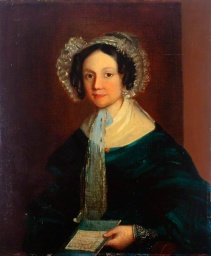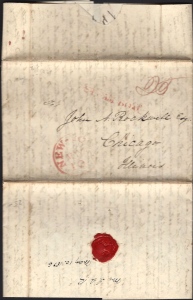
This letter was written by 32 year-old Mary Watkinson (Perkins) Rockwell (1804-1887), the wife of U.S. Congressman John Arnold Rockwell (1803-1861). As a young woman in 1818 and 1819, Mary received a formal education at Sarah Pierce’s Female Academy in Litchfield, Connecticut. She married John Arnold Rockwell in 1831 and resided in Norwich, New London, Connecticut, where John practiced law until until 1838 when he was elected to the State Senate. He was soon after chosen Judge of New London County. In 1847 he was elected Representative to Congress from the Third Congressional District of Connecticut.
In the second paragraph, Mary mentions John’s older brother Charles William Rockwell (1799-1866) of Norwich, New London, Connecticut. Charles was a member of the Connecticut State House of Representatives in 1834 and 1836.
John and Mary had five children — Mary Watkinson Rockwell (1832-1839), Alfred Perkins Rockwell (1834-1903), Charles Rockwell (1836-1843), John Arnold Rockwell (1840-1924), and Joseph Perkins Rockwell (1843-1885). Though the letter is not dated, Mary mentions their son Alfred (b. 1834) and “his poor little sister” Mary who appears to have been afflicted by a “projection on her back” that “evidently increases.” Perhaps she was suffering from severe scoliosis or some other malady. In any event, these clues suggest the letter was written in the mid-1830s before John A. Rockwell entered politics. The letter can more precisely be dated to May 1836 by the reference to Rev. Alvan Bond’s 2nd marriage in the last paragraph.
The reason for John Rockwell’s journey to Chicago can only be conjectured but it most likely had something to do with the building lots in the town of Rockwell, La Salle County, Illinois, that were to be sold at Public Auction in Chicago in October 1836. John and his brother Charles were listed among nine “trustees” (investors) advertising the auction in Eastern papers. A plat map of the town published on 1 August 1836 shows the lots for sale by the “Rockwell Land Company.” According to an article by John D. Haeger published in the Journal of the Early Republic (1983), the Rockwell Land Company was a firm composed of eastern and western entrepreneurs anxious to capitalize on the profits of the 1830s land boom… Located on the Illinois River about ninety-five miles south of Chicago, [Rockwell] was initially touted as a likely site for the terminus of the Illinois and Michigan Canal. Since Rockwell’s founders forbade the manufacture and sale of alcohol, the town also reflected that curious mixture of capitalist incentive and reform zeal often found in Jacksonian businessmen. But dreams quickly faded into nightmares. Rockwell lost the race for the canal to neighboring LaSalle and then suffered through two seasons of illness and nearly a decade of depression. By 1850, it had been totally incorporated into LaSalle. Today, the original site of Rockwell is, in the words of one local resident, just a “big ditch.”

TRANSCRIPTION
Addressed to John A. Rockwell, Esq., Chicago, Illinois
[Connecticut]
Thursday Evening [May 1836]
Dear Husband,
How strange it seems to keep writing letter after letter as it were a kind of journal, and yet answering none, for though I am privileged with the presence of many kind and interesting letters, yet these seem to be coming on so long after as almost to have no connection with them. “Flat — stale — and unprofitable” enough, they all seem by the time you arrive at the place where they have already become inhabitants. I declare the very thought is enough to deter me from writing another line. Then comes the recollection that to the traveler, news from home is always welcome — and my pen jogs on again.
And as brother Charles [Rockwell] said the other day as I went into the office as he was sitting down to write to you, “you recollect John does not like to receive short letters.” So after having assured you of the welfare and health of all, how my pen fills up the rest of the blank with sentences — such as they are. I have nothing new to write about.
The family, mother and myself are tolerably well and the little folks remain in “status quo.” Alfred grows strong and resolute every day, although he looks as pale as ever, and his father is in constant danger of losing his peculiar privilege of being master of the house — the young gentleman already assuming a very authoritarian manner — his poor little sister shrinks from his approach as from a wild animal when she is lying on the floor, a situation by the way, that she prefers to any other. Indeed, I have sometimes to be very decided to get her anywhere else, and you know how difficult it is to engage with poor little Alla, who wants to be around everywhere while his sister chooses to be most of her time lying on the floor surrounded with her playthings. I think she appears very much as when you left except that I think the projection on her back evidently increases and I should suppose it was a proof of it that she is some days (when she happens to feel more languid) entirely unwilling to sit up, cry and scream when I awake her Do &c. Both the children are out a great deal in the air whenever the weather admits. We have not had such warm weather nor such delightful verdure as you have been permitted to enjoy, still some pleasant days have cheered us very much.
This has been a charming spring day, and perhaps I have thought the more of it as there was a great departure in the steamboat this afternoon — as somebody said, “all Norwich was going to the Anniversaries.” And the travelers for Ohio also left, Judge G. and daughter, Mrs. Child and Mrs. C. W. [Emeline Hall] Rockwell, really have gone, and I am actually here — to remain, without I follow the advice of Mrs. Charles William Rockwell and M. Huntington to go on with Charles and join all of you at Chicago. N. H. promised Emeline she would use her best c______ to send me along. I took a long ride with the children and went and bid them all goodbye and afterward down street, saw them all walk down to the boat. Fanny also went down in the boat to New London to make a visit till next week — and Abby [Perkins] is this week making Mrs. Jed P. a visit, so that tonight we feel quite still and solitary, also Jacob, who is staying with us, went down to spend the night with his cousins.
Good night dearest.
Sunday morning —
Another week has passed since the Sabbath you were to spend at Louisville and where are you now, dear John? I met Mr. Tr_____ the day I was writing the first pages and he said he should think it time according to your instructions to direct to Chicago so I concluded to defer closing my letter a day or so thinking something might arise to impart to you. Another letter to acknowledge, I was much gratified to receive your second letter from Cincinnati, and on Saturday evening as the rain had somewhat ceased, I sent John to see if there was anything from the mail and was surprised and delighted to see the well known handwriting, with the Louisville postmark. Was the boat in perpetual motion while you were writing? Doesn’t or did your hand tremble at thinking you were approaching the country of bears, wolves, and Indians? I was amply repaid, however, for exerting my guessing powers — by your account of all the agreeability and many pleasant things that present themselves before you. It must have been quite a treat to have seen Mrs. Duncan &c. Not a word about her husband. Where was he all the time? And Mrs. Fana — she was a charming old lady. I think you have been fortunate in the way of company.
I must not forget to tell you that Mr. & Mrs. Huntington and E. Watkinson set out last Monday for the West. Mrs. Huntington & sister to stop in Ohio. I believe I have made a mistake as ’tis tomorrow. What a fine season in prospect — when I hear of their plan and that E. was going with them I actually for half a day thought of little else in trying to make up my mind to go and join them, or give up the West altogether. But I felt that it might appear to Mr. Huntington like presenting my company without invitation and I gave it up forever.
So you may tell the Western folks that politely inquire when your wife is coming that in future Mrs. Rockwell will be happy to see her friends in Connecticut. My regard to all who in Chicago may enquire for me. I presume Mr. & Mrs. Hubbard are by this time arrived. Capt. Jed and his son John left sometime since and have been heard from at Buffalo where they met accidentally Mr. White who had got no further on his way to Grand Haven [Michigan]. Uncle Perkins was up on Friday and enquired for you and wondered what could send you to the West. His son the doctor is traveling there, gone to see his son Elias who is connected with some railroad engineering “somewhere.”
Did I mention that Mrs. Mitchell has removed here with her family and quite domesticated in the old house. Some of her friends think she has come to lay her bones as she is in very feeble health. Mr. C. W. Rockwell went to New Haven last week to take his honored seat [in the Connecticut House of Representatives].
Mr. [Alvan] Bond has actually last week gone on to be married and this week they opened in New York and Mr. Stovis preached for us today. Now tell me, do you think there are many gentlemen that receive such sentimental letters as this — but perhaps it may make up for the dry sticks I sent to Illinois. With my love and best wishes in which all join.
Yours ever and truly, — M. W. R.
¹ Rev. Alvan Bond was born April 27, 1793 at North Parish, Sutton, Massachusetts. He married Sarah Richardson 25 April 1821 in Medway, Mass. The couple made Sturbridge, Mass. their home. Six children were born to them . Sarah died in August 1834, four weeks after giving birth to a infant daughter, at Bangor, Maine. Alvan married second Mehetabel A. Bull in May 1836 at Norwich, Connecticut. Two children were born to this marriage. Mehetabel died on October 4, 1844. He married third on October 2, 1849 a Miss Davis, with whom he had been acquainted with from her early youth, at Keene, New Hampshire.





Is there a print to show what Cong. John A. Rockwell looked like?